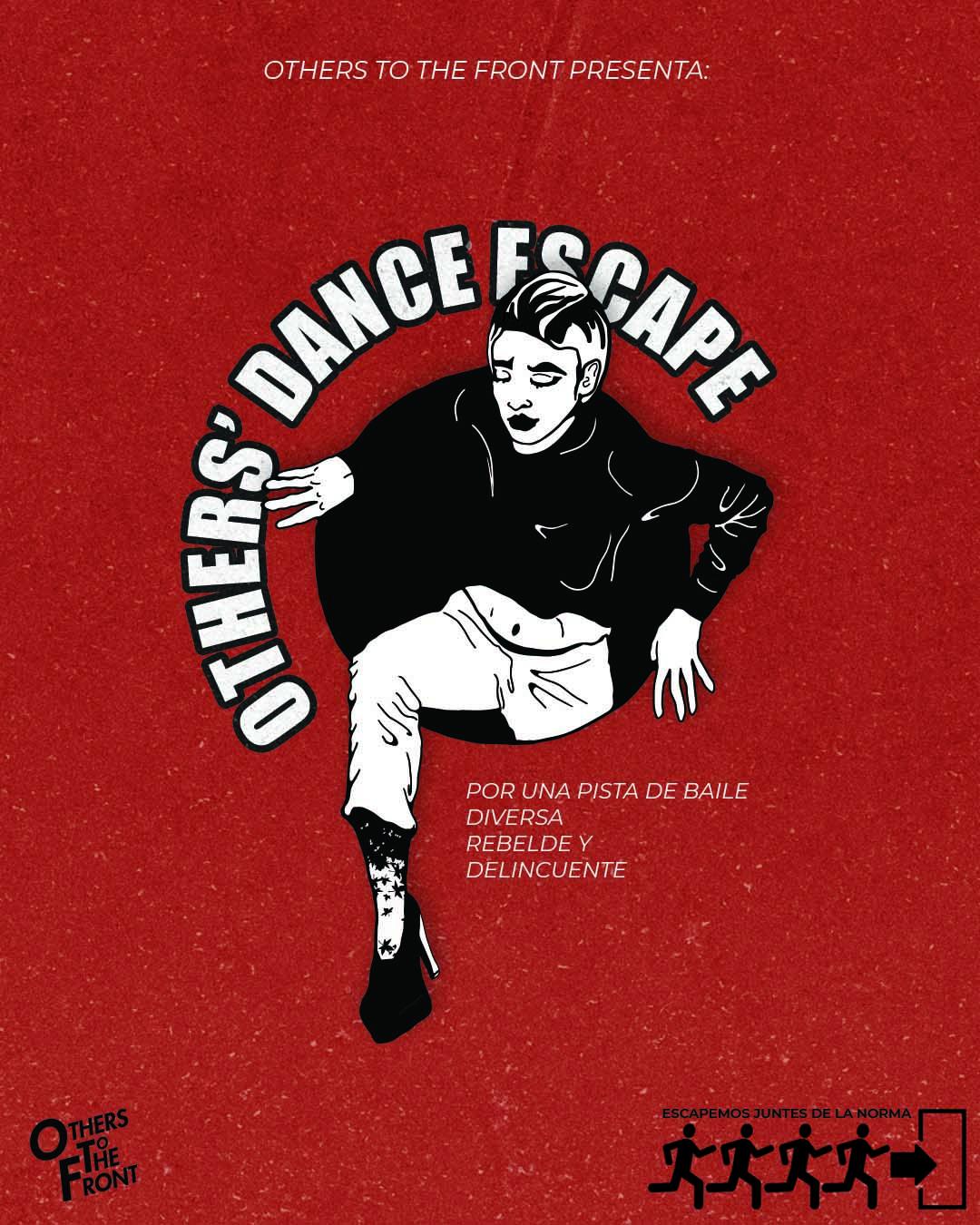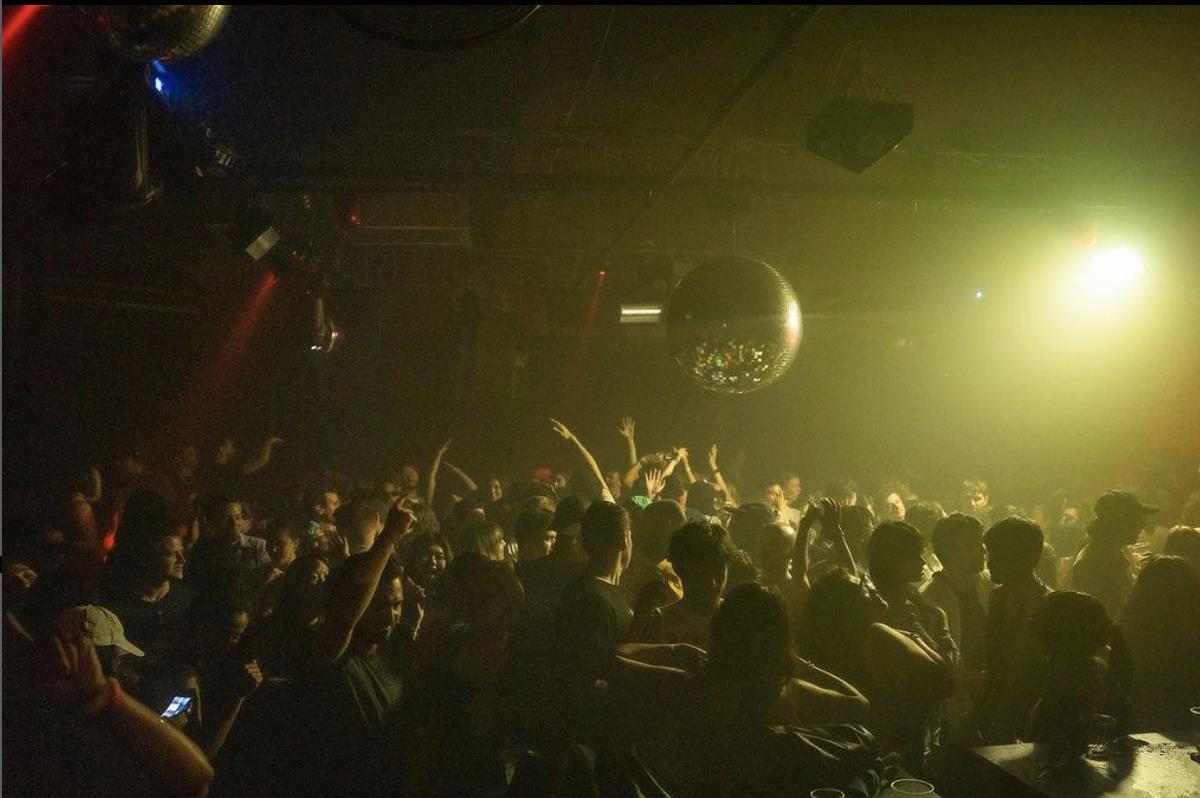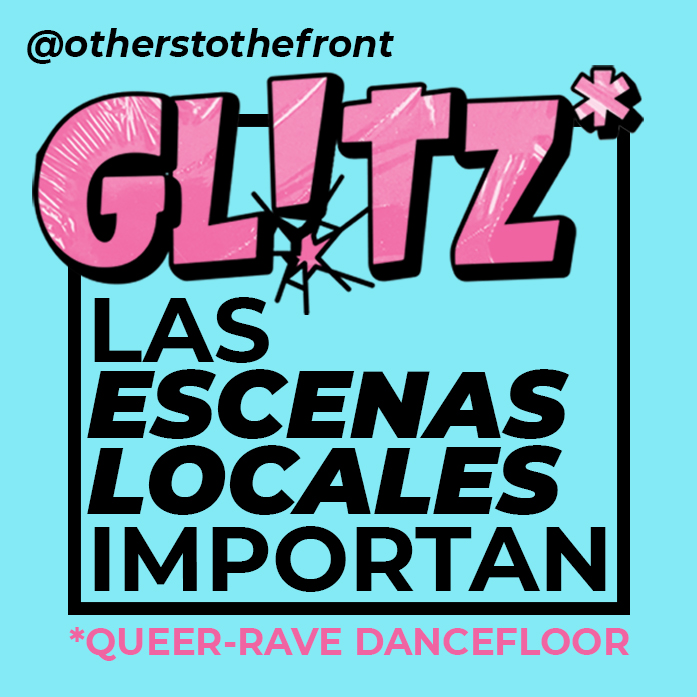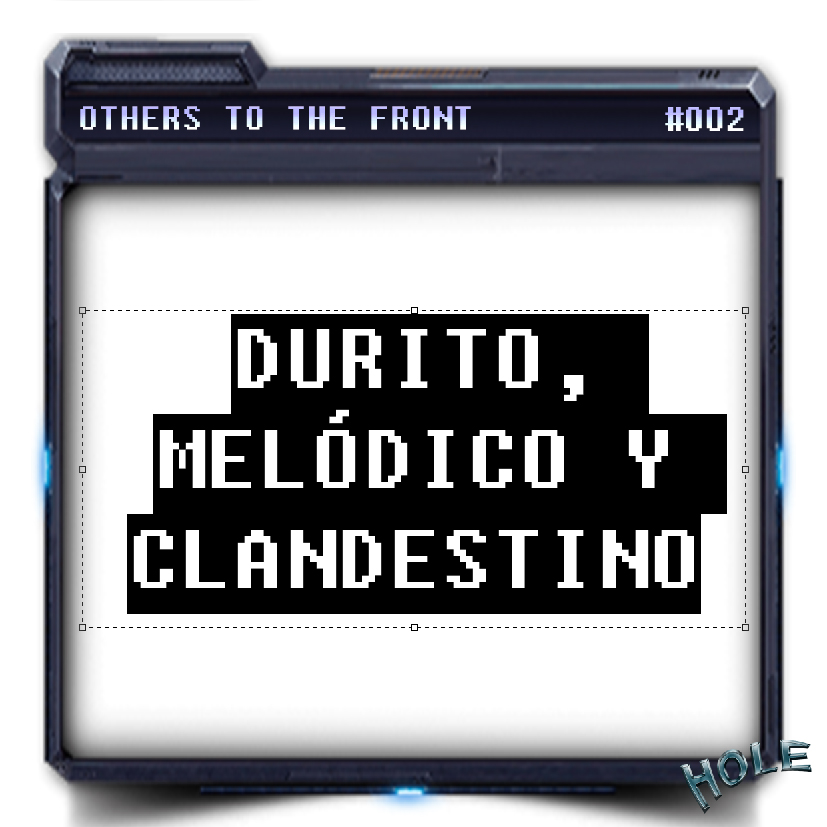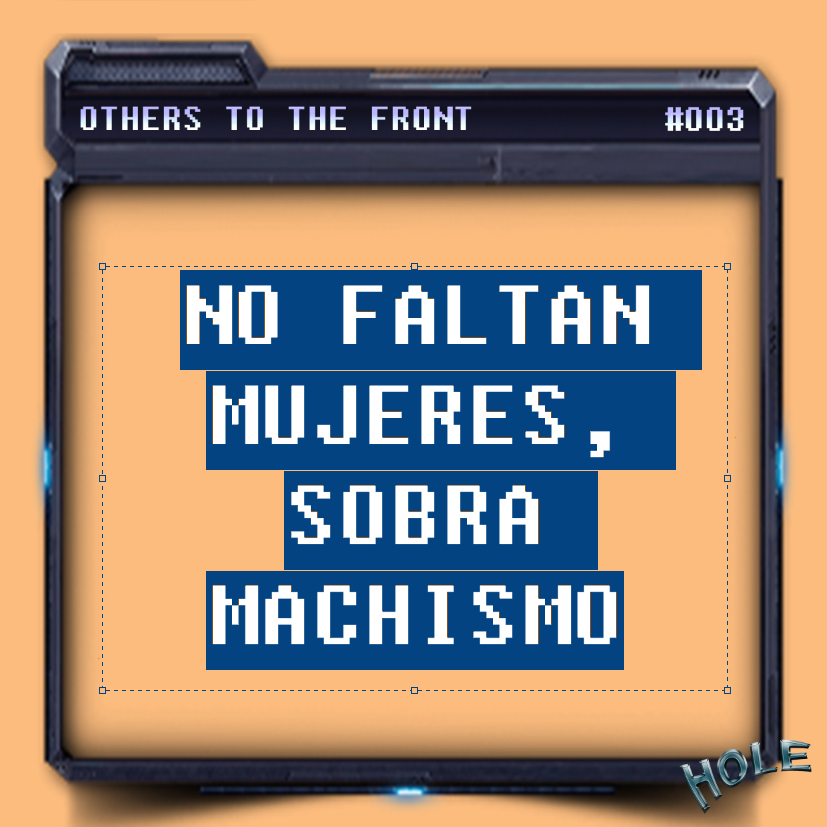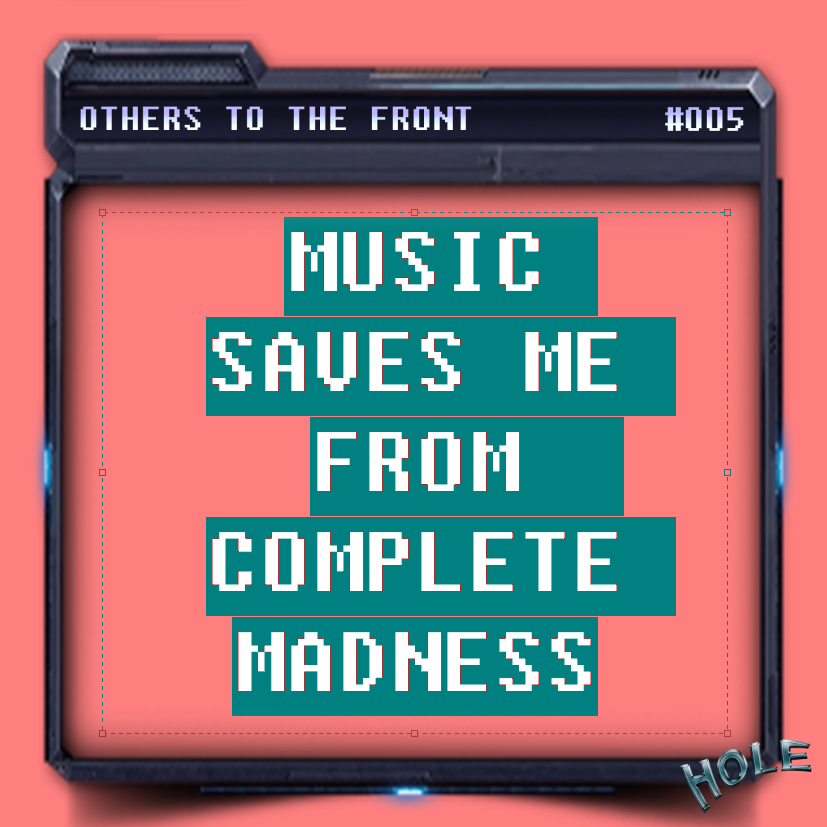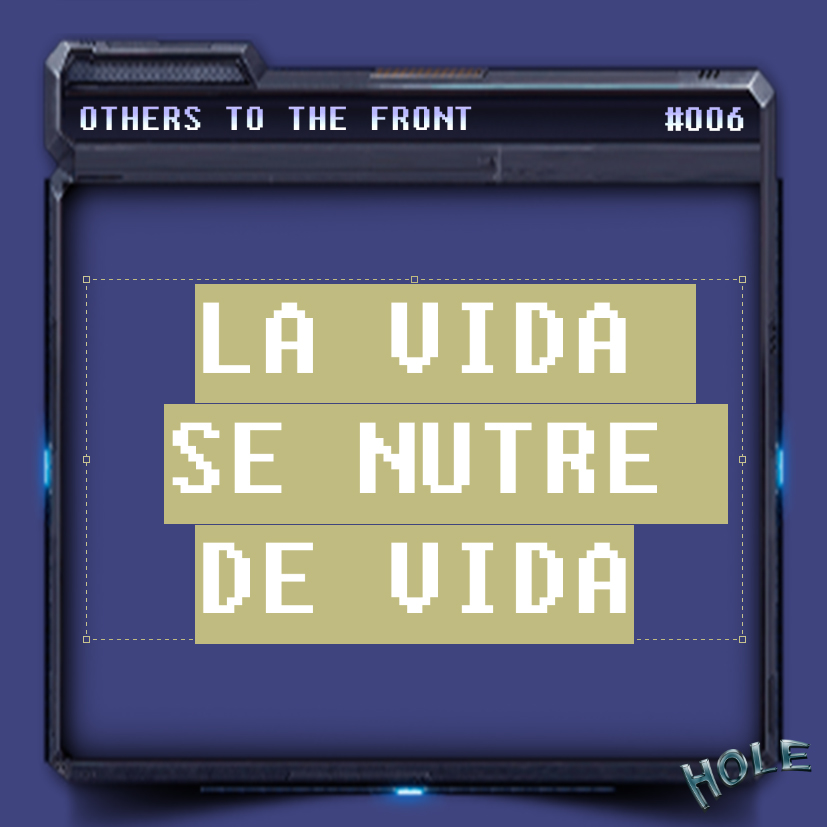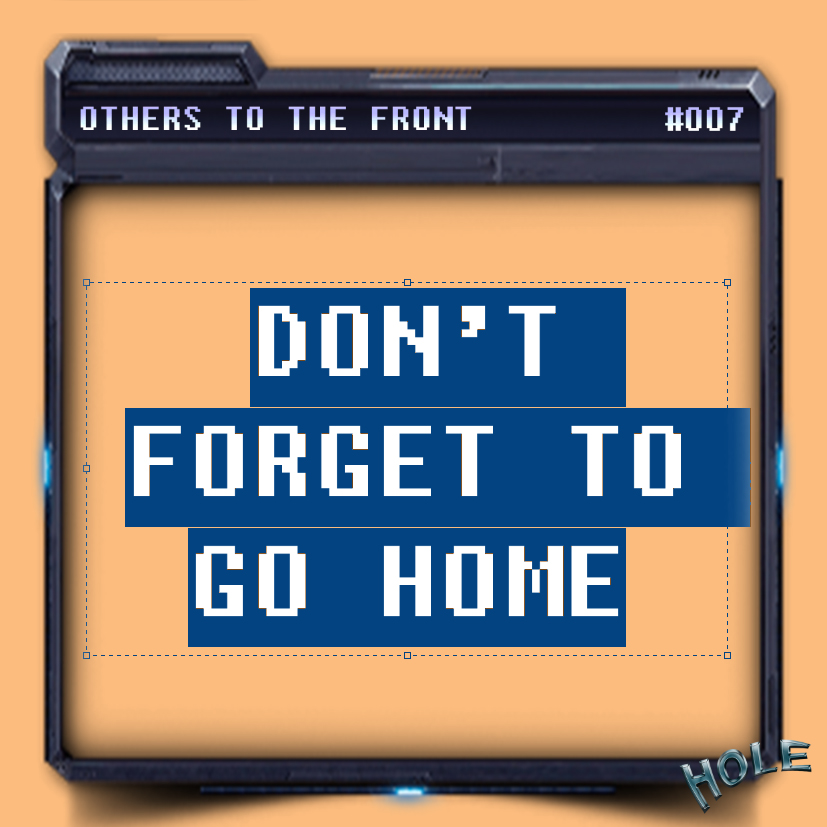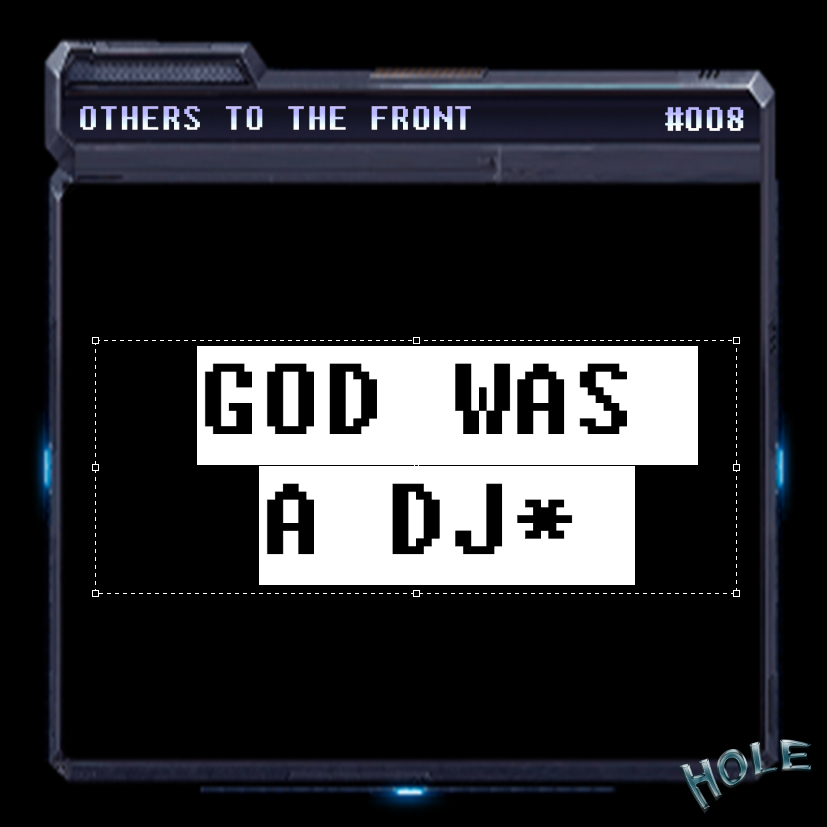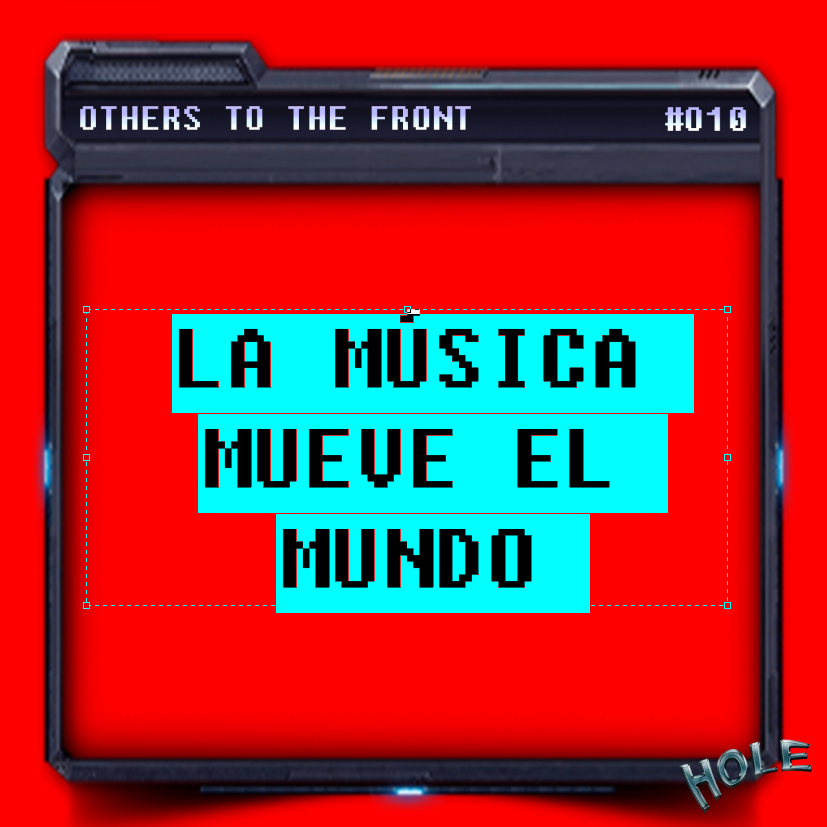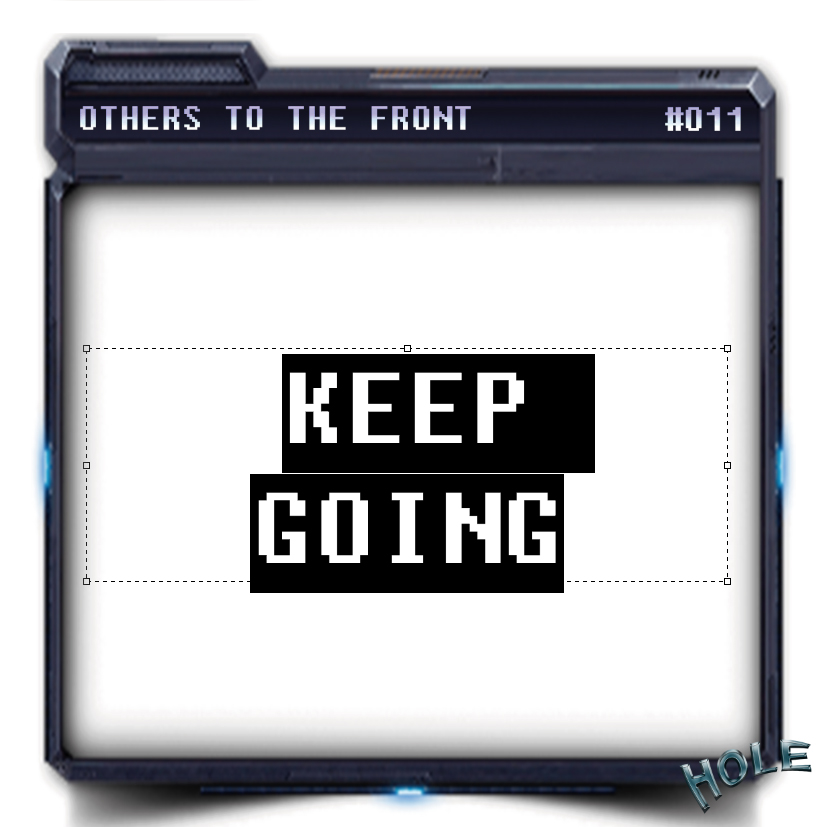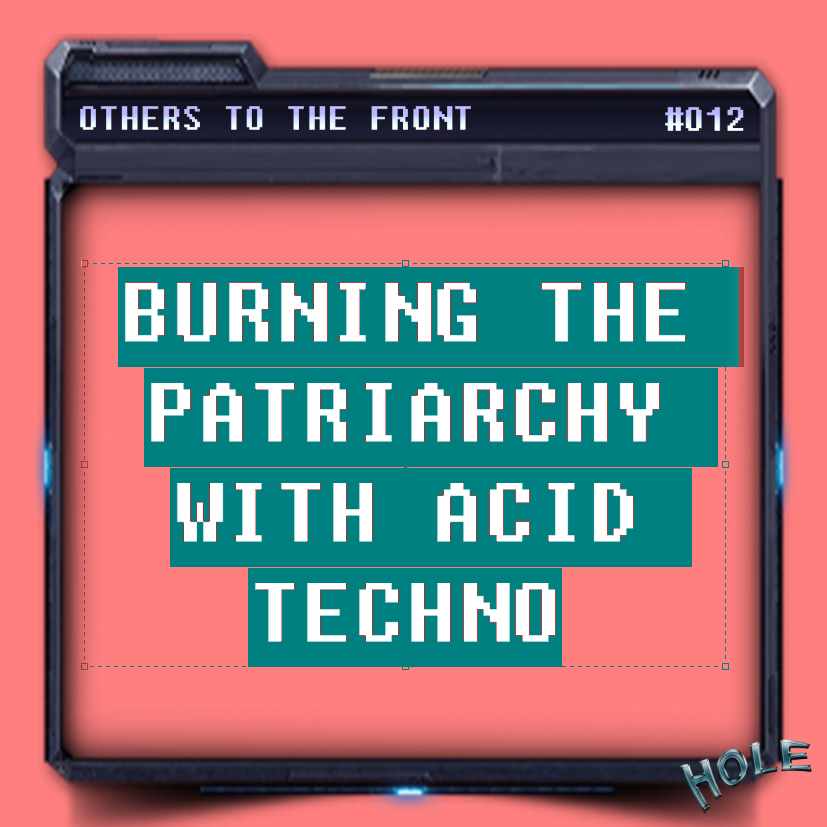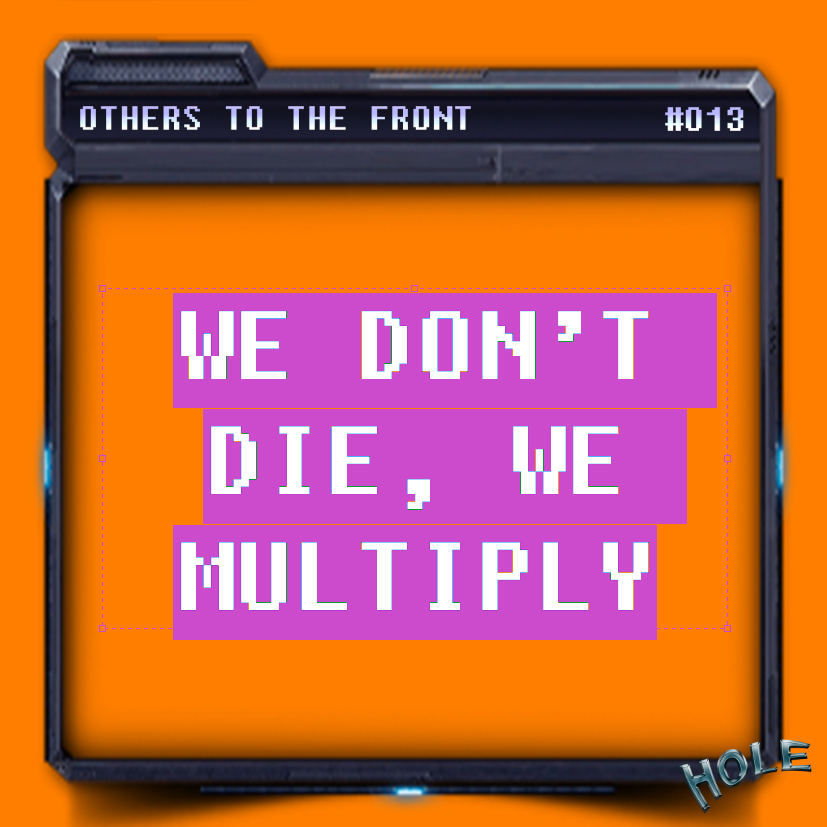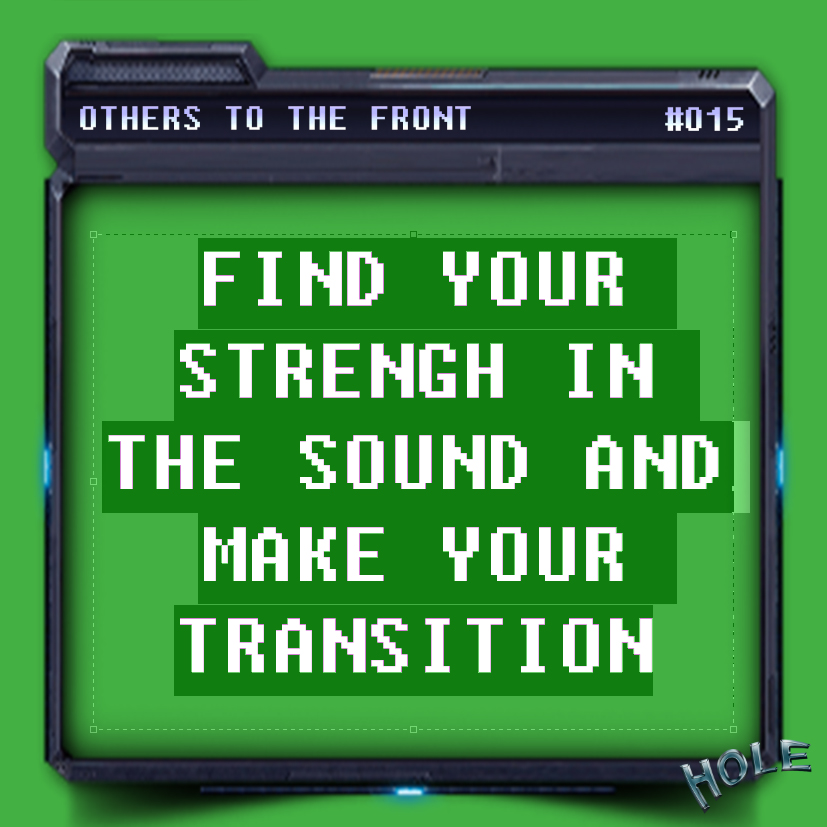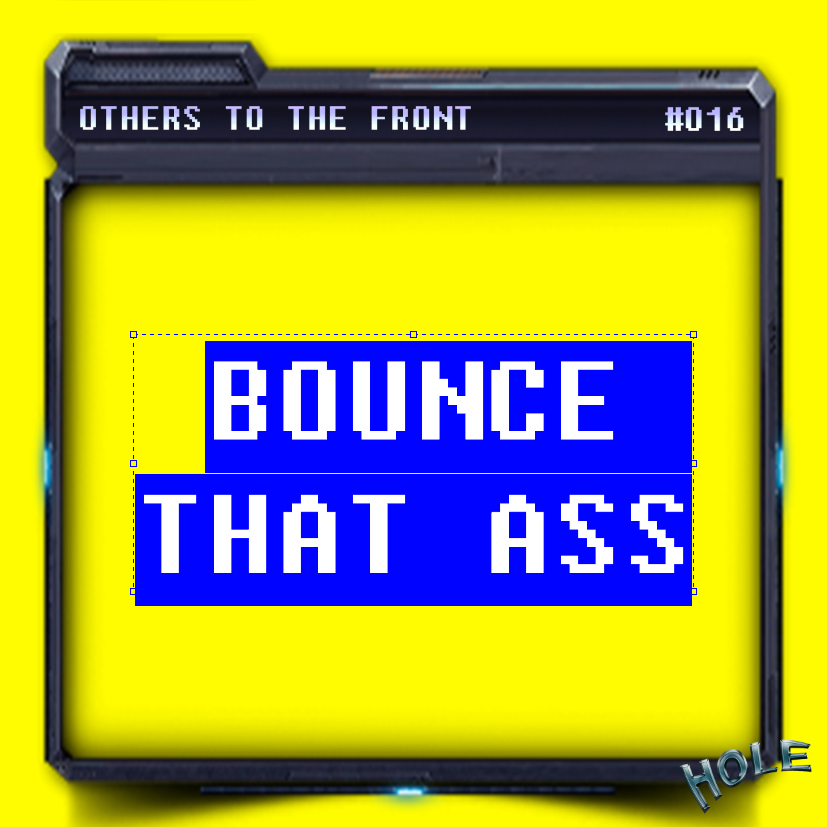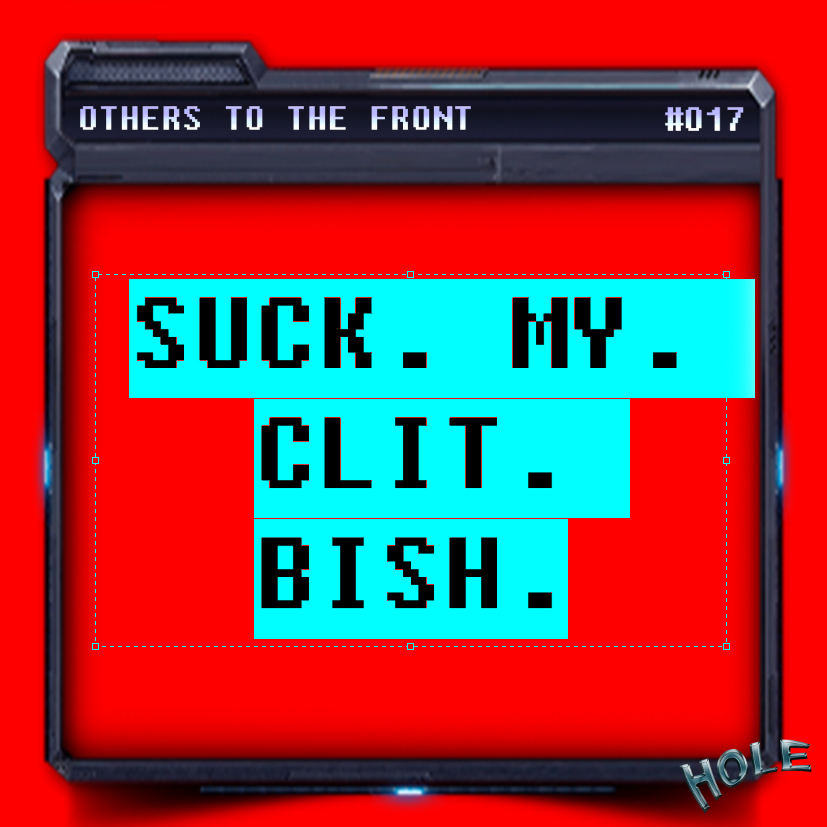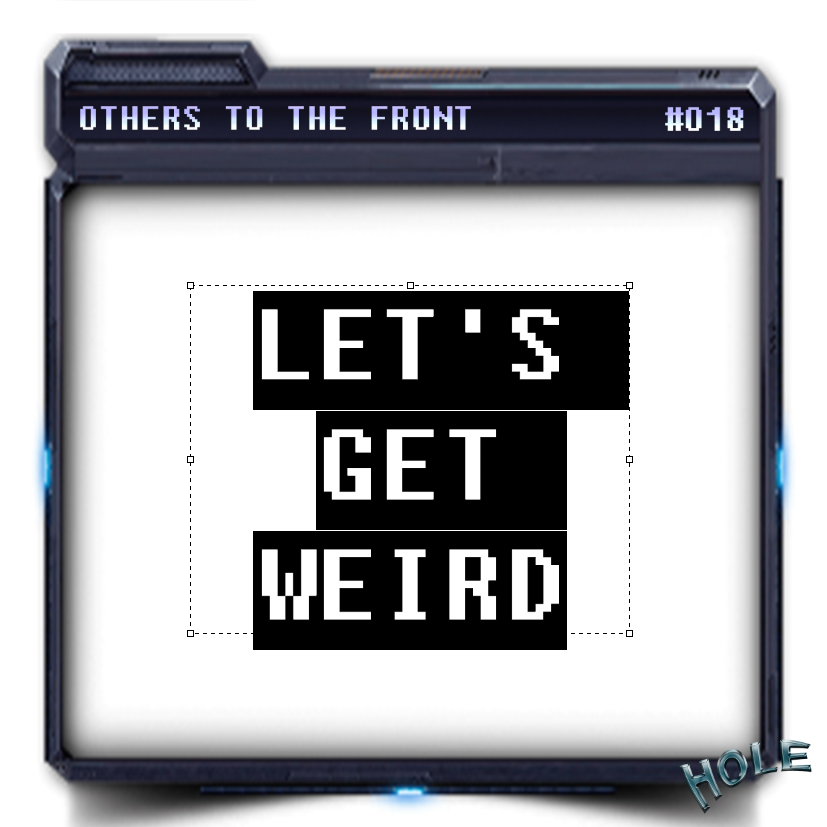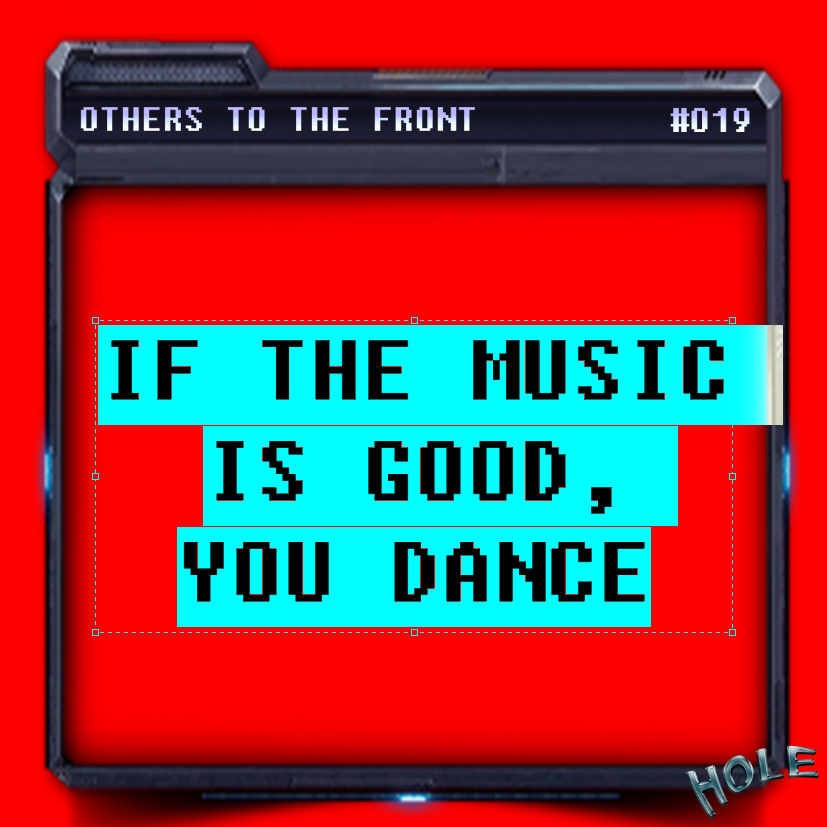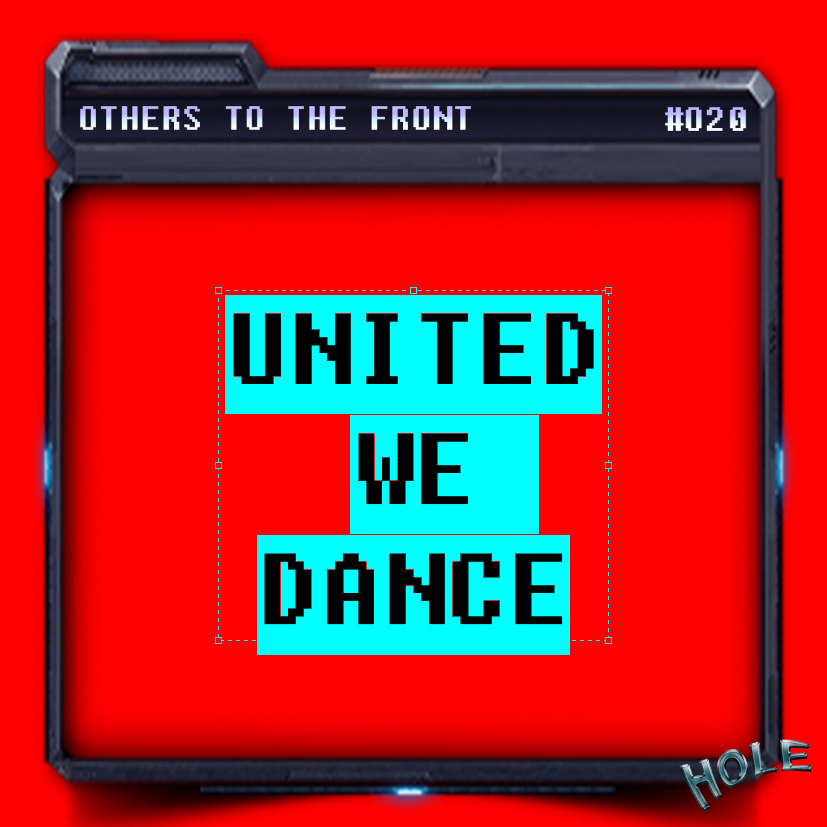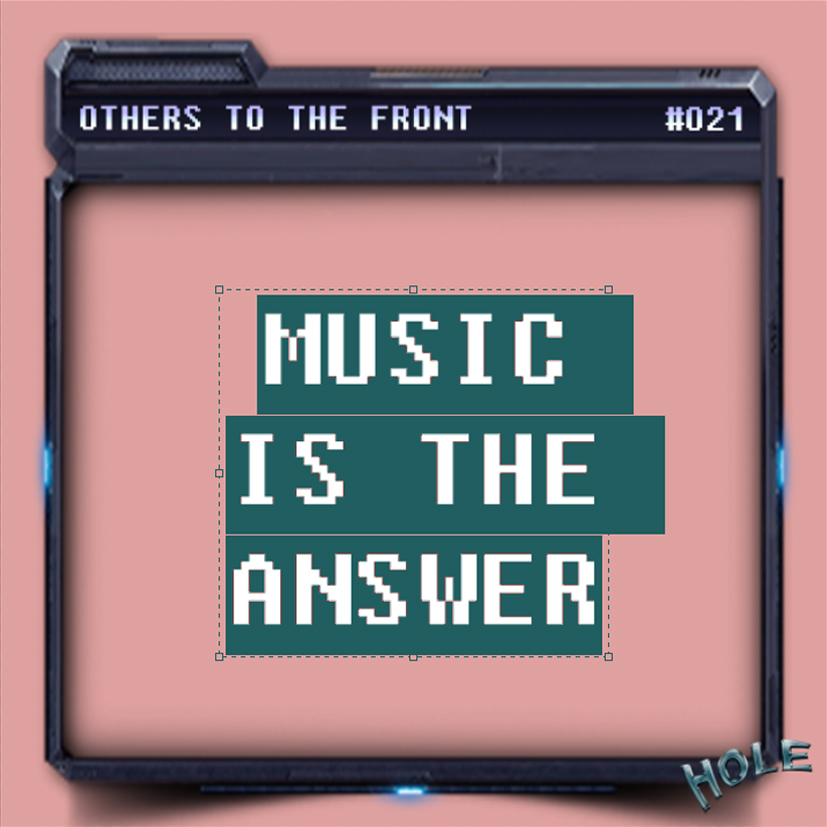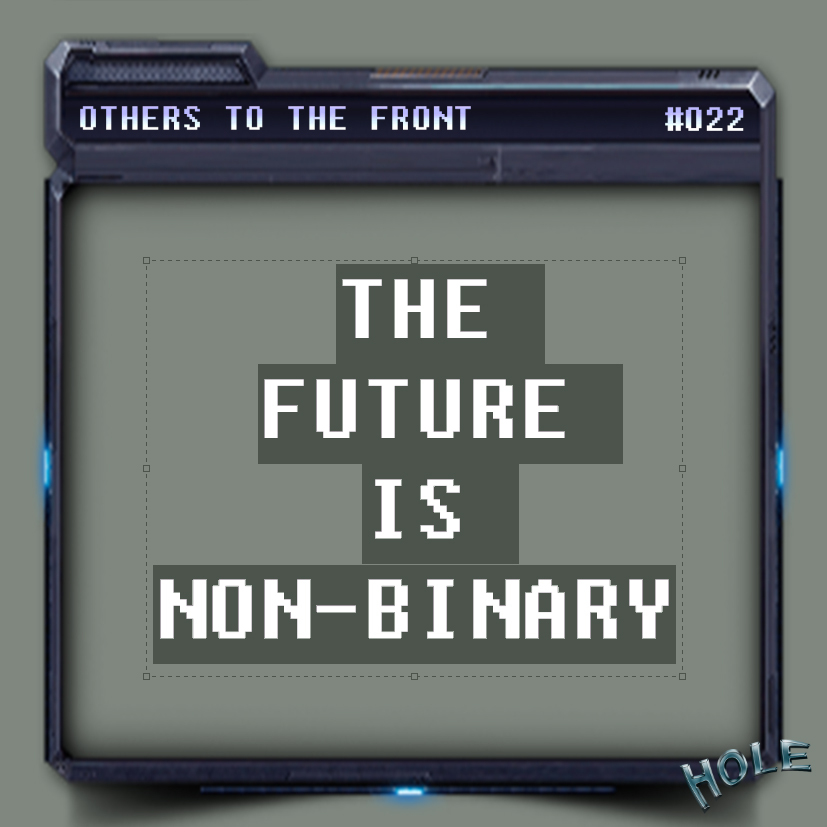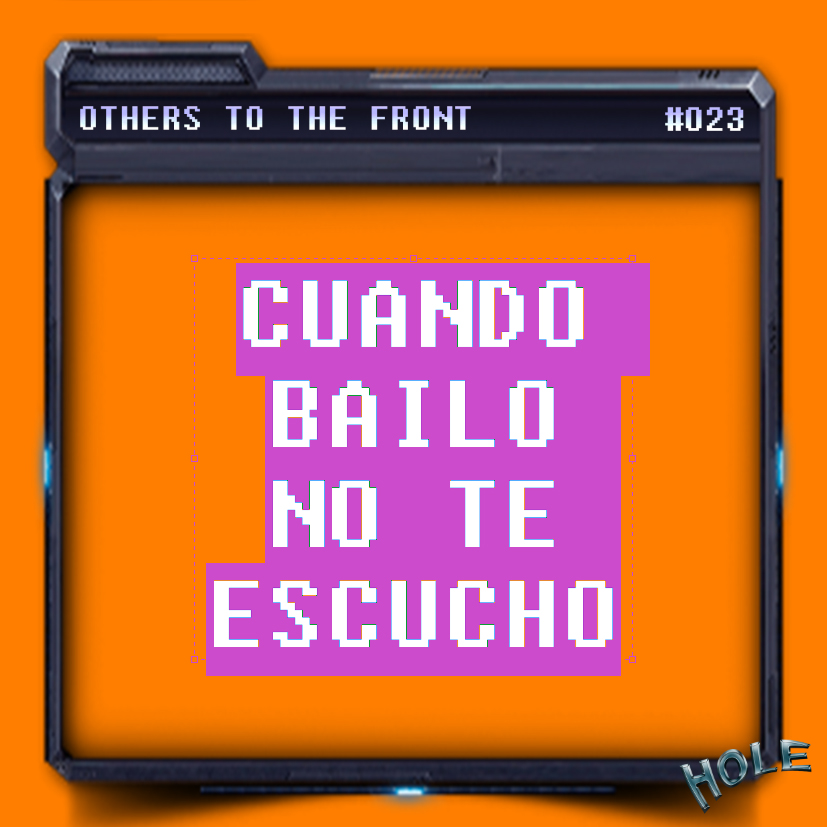- Hola, el día 3 de Junio nos encontraremos en la pista de baile ¿podrías presentarte para la comunidad de Others to the Front?
Hola, estoy muy emocionada de pinchar en Madrid por primera vez. Mi nombre es Michelle Manetti, DJ residente en la rave más famosa de Londres, Adonis, y promotora de Fèmmme Fraîche, una de las mayores fiestas queer de Londres centrada en FLINTA*
(*FLINTA son las siglas en inglés de Mujer, Lesbiana, Intersexual, Trans y Agénero.
Representa a cualquier persona que no sea un hombre cis.)
- ¿Qué nos puedes decir de la escena queer londinense, de la que formas parte, cómo se ha construido a lo largo de los años y cómo definirías su momento actual?
Es fabulosa, está en constante evolución y tiene algo para todo el mundo. Ha crecido mucho en los últimos años y ahora no se trata solo de ir a una fiesta solamente por ser gay, sino hay muchas opciones, por ejemplo, hay noches queer centradas en Latin X (Popola), para queer wmxn a quienes les gusta el tecno (Big Dyke Energy), para POC Femmes (Pxssy Palace), incluso para queers neurodiversos (Spectrum), realmente puedes encontrar tu nicho, la música que te gusta, etc. Es colorido y diverso y la comunidad es tan fuerte como siempre.
- En comparación con las escenas continentales, uno de los rasgos distintivos de la escena dance underground londinense ha sido siempre la presencia muy destacada de la música house y la cultura house. ¿Cómo te ha influido esta escena? ¿Qué crees que ha tomado de ella y qué le has aportado?
Sin duda, la música house y la música comercial (las listas de los 40 hits más populares) siempre han sido la música más popular en los clubes del Reino Unido en general, con algunos otros subgéneros por aquí y allá, como el drum & bass, el dubstep, el garage y, más recientemente, mucho más techno y breaks. Soy una gran aficionada al house. Llevo yendo a clubes de house desde mediados de los 90, cuando era un adolescente menor de edad: fue la banda sonora de mi adolescencia, de mis 20 y de la mayor parte de mi vida adulta. Encontré la música que me gustaba en esos clubes y, junto a ella, amigues, mi gente, amantes y, lo más importante, a mí misme. Ha sido lo más constante y lo que más me ha dado en la vida (aparte de mi maravillosa y comprensiva familia). Como consumidora, me sentía tan conectada a la música que me obsesioné, así que la transición de consumidor a proveedor fue natural. La obsesión nunca se detiene, siempre encontrando nuevas canciones, descubriendo joyas, la emoción de compartir eso con la gente, haciendo bailar a la gente y viendo cómo, como yo, esas personas encuentran amigues, a sí mismes, crean recuerdos, me da tanta alegría verlo.
- Háblanos de tus fiestas Femmme Fraiche. Echando un vistazo a eventos anteriores, y a la larga lista de invitados que habéis tenido, parece que habéis conseguido una buena mezcla de nombres consagrados con nuevos talentos. ¿Es esto lo que buscaba en un principio? ¿Cuáles son las perspectivas de esta fiesta en un futuro próximo?
Efectivamente, sí. En primer lugar, la fiesta pretendía ofrecer un espacio necesario para la gente de Queer Wxmn / FLINTA, pero también se trataba de crear una plataforma para les artistes marginades, para que les DJ más importantes pincharan para un público marginado, así como de ofrecer un espacio y una plataforma para los nuevos talentos. Algunas de las estrellas emergentes que contratamos han llegado a lo más alto: Eliza Rose y Jaguar, por nombrar dos. Recientemente hemos actuado en escenarios y festivales, y es algo que me gustaría impulsar aún más, para hacer crecer la marca y aumentar la visibilidad, así como diversificarnos en otras áreas del espectro musical, quizás un sello o una agencia. De momento, todo son ideas, pero sin duda hay margen de crecimiento.
- Pareces haber estado muy arraigada en la escena del este de Londres y, en particular, en Hackney. Hackney ha sido una potencia musical underground durante muchos años pero también ha vivido una enorme presión gentrificadora. ¿Cómo has vivido esos procesos contradictorios que afectan a Hackney? ¿Crees que el arraigo local es algo importante para las escenas underground de música de baile?
Vivo en Hackney Wick desde que volví a Londres desde Brighton, hace 15 años. El Este es mi hogar y para mí la mejor parte de Londres, es arenosa y creativa, pero sí, está cambiando y muy rápidamente, se está volviendo mucho más caro vivir, por lo que muchas de las personas creativas se están mudando – el dinero se está moviendo hacia adentro, por lo que el proceso de gentrificación está cambiando la dinámica de la zona. Las cosas que hacían que la zona fuera interesante y creativa están desapareciendo poco a poco. Yo aguanto, pero no creo que pase mucho tiempo hasta que el paisaje sea completamente distinto. He visto qué pasó a Soho, luego a Shoreditch y ahora a Dalston y Hackney, todo ello en un periodo de 15 años. Walthamstow, Canning town… son lugares que ahora tienen espacio, están apareciendo almacenes… pero dentro de poco también serán ocupados por inmobiliarias. Para mí, era importante estar en el meollo, tenerlo en la puerta de casa, vivirlo y respirarlo, pero viendo lo transitorio que es ahora, creo que eso es menos importante, siempre y cuando esté lo suficientemente cerca como para ser accesible.
- El informe FACTS de Female:Pressure dice claramente que las personas FLINTA siguen estando muy excluidas de las grandes programaciones y festivales. Parece que en algunas ciudades europeas, como Berlín o Londres, se están desarrollando nuevas escenas rave queer, pero siguen estando muy por detrás en recursos en comparación con las escenas dominadas por hombres. Mientras que en otras ciudades, como Madrid, sigue siendo habitual encontrar line-ups de cis-hombres blancos. ¿Qué opinas de esto? ¿Cómo crees que va a evolucionar en un futuro próximo?
Desgraciadamente sí, los carteles de hombres blancos cis existen y siguen siendo la norma en muchos festivales de música electrónica. Creo que la escena queer y otras escenas marginales se esfuerzan más por tener diversidad e inclusión en sus carteles, porque entienden la importancia de ello, pero fuera de eso, sigue siendo un poco un «club de chicos». Aún nos queda mucho camino por recorrer, pero, dicho esto, hemos avanzado mucho desde que empecé a pinchar. Recuerdo que antes de convertirme en DJ solo había un puñado muy pequeño de mujeres o de DJ marginades que pinchaban con regularidad, ahora hay muchas más y mucho más visibles. Hace sólo unas semanas se celebró el Risen Festival en Hackney Wick, todo un festival dedicado a artistas FLINTA y toda la gente de BHS también era FLINTA. Justo antes de la pandemia, también hubo una encuesta sobre los DJs más contratados en festivales, y 3 de los 5 primeros eran mujeres: Charlotte De Witte, Amelie Lens, Nina Kraviz, lo que demuestra que hay algunas mujeres importantes en la cima, lo cual es alentador. La Fundación PRS puso en marcha la iniciativa Keychange, por la que 45 festivales se comprometieron a combatir la desigualdad de género mediante la aplicación de un 50/50 en sus respectivas alineaciones, paneles de conferencias y más en 2022, creo que más festivales se han unido desde entonces, por lo que las cosas se están aplicando, los cambios positivos están sucediendo, simplemente es un proceso lento.
- ¿Recuerdas el primer tema que tocaste en público? ¿Cómo fue ese primer bolo? ¿Puede hablarnos de esa experiencia?
Recuerdo perfectamente el primer set que toqué. Fue en una pequeña fiesta lésbica en Brighton llamada Koochy, en un bar lateral de lo que entonces era el Honey Club. La promotora era una conocida DJ queer de la escena a la cual había dicho varias veces en noches de fiesta que quería ser DJ y que estaba aprendiendo, y un día me llamó para decirme que iba a empezar una nueva noche de chicas y que quería que yo fuera la cabeza de cartel. Esto fue alrededor de 2003, entonces sólo había vinilos y planeé mi set, disco por disco, recuerdo que llamé a todos los otros DJ’s para decirles lo que iba a poner y les pedí que no pusieran los mismos discos, todos se rieron cariñosamente, pero accedieron. Ahora no podría decirte ni uno solo de esos discos, sólo recuerdo que estaba tan nerviosa que casi vomito y me desmayo, pero también recuerdo lo increíble que fue la sensación cuando el set salió como un sueño.
- Cuando echas la vista atrás, ¿hay algo que eches de menos de aquellos primeros días como DJ? ¿Y algo que te alegre haber dejado atrás?
Echo de menos pinchar vinilos, solía conocerme todos los discos de mi bolsa de arriba a abajo, pero no echo de menos lo caro que era mantener esa colección, aunque sigo comprando algunos vinilos de la vieja escuela, pero ya casi nunca pincho vinilos. Me gustaría poder decir que no echo de menos los nervios, pero sigo sintiéndolos, no de una forma que induzca al vómito, pero sí una leve ansiedad antes de los conciertos, sobre todo de los grandes. Los DJ más nuevos suelen preguntarme si alguna vez desaparecen y yo les digo que no, pero también creo firmemente que en el momento en que dejas de sentir nervios, es el momento en que deja de importarte, los nervios sólo demuestran que amas lo que haces y que quieres hacerlo lo mejor posible, y la adrenalina te mantiene sediento.
- Has empezado a producir música recientemente, y también eres vocalista, ¿sientes que es muy diferente a pinchar como proceso de trabajo? ¿Cuáles son tus expectativas en este campo?
Totalmente, aunque son muy simbióticos, son habilidades muy diferentes, un buen DJ no hace necesariamente un buen productor y viceversa. Sin embargo, hoy en día la mayoría de los buenos productores de música dance o electrónica necesitan actuar en directo, ya que es ahí donde está el dinero, no en las ventas, y del mismo modo muchos buenos DJ se pasan a la producción, porque sin lanzamientos tocas un poco el techo en cuanto a lo lejos que puedes llegar como DJ. Yo personalmente, primero fui vocalista, pero quería aprender a crear mis propios temas y no los de otros, así que fui a la universidad a aprender producción, pero enseguida me di cuenta de que quería saber qué funciona en una pista de baile, qué busca un DJ, antes de poder apreciar lo que hace un buen tema, así que aprendí a pinchar y, en poco tiempo, el DJ se convirtió en mi principal habilidad.
- Nos conocimos porque, durante la pandemia, pinchaste en la anterior Parcha Party de XOXA NYC de Materia Hache y nos conectamos al live streaming de tu set. Los momentos de auto encierro de la pandemia, en cierto modo permitieron a muches de nosotres, principiantes, hacer estos nuevos contactos y conocer gente afín, amante de la música, más allá de las fronteras. ¿Cuál ha sido tu experiencia al respecto? ¿Crees que la comunidad se hizo más fuerte y más grande después de la pandemia? ¿Existe una nueva escena post-pandémica?
Sí, la comunidad es una parte muy importante de la escena Queer y de otras escenas underground, necesitábamos encontrar formas de mantenernos conectades en una época de tanto aislamiento, y creo que la gente sobrepasó sus propios límites para conseguirlo. Yo no me involucré mucho con las cosas en línea, en realidad soy un ermitaña bastante cómoda y disfruté del tiempo de inactividad en solitario, pero fue realmente magnífico ver algunas de las cosas que sucedían y nacían creativamente de esta frustración aislada. Creo que después de la pandemia, en la escena queer en particular, muchos maricas jóvenes y frescos empezaron a abrirse paso como promotores, con ideas emocionantes un poco más fuera de lo común. También creo que después de la pandemia, el público de los clubes y las fiestas parece más joven. Es como si los más mayores se hubieran dado cuenta de que ya no tenían necesidad de salir de fiesta y, al mismo tiempo, los más jóvenes, a los que se les había arrebatado esa necesidad, estuvieran más hambrientos de fiesta que nunca. Pero también sentí que el sentido de comunidad, la importancia de tener a tu familia elegida a tu alrededor y los lugares seguros para cultivar la autenticidad son aún más fuertes después de la pandemia.
- Dentro de la semana hay muchas horas de trabajo de djs y promotores que no son visibles, ¿cómo afrontas los días entre semana, haces más cosas relacionadas con la música o te centras más en descansar del fin de semana?
No creo que la gente entienda del todo el trabajo que conlleva ser DJ, nos ven el fin de semana pinchando unas horas y piensan que parece glamuroso trabajar sólo unas horas a la semana, pero esto es sólo el pico de la montaña, la gente no se da cuenta de las horas de trabajo que hay entre medias y más cuando eres promotor o productor. La mayor parte de mi semana la dedico a la administración, a hacer cosas para Femmme Fraiche o a buscar y organizar música nueva, a buscar conciertos, promoción, entrevistas, etcétera. Mis amigos productores pasan la mayor parte del día en sus estudios, y a mí también me gustaría tener más tiempo para dedicarme a ello. Pero me encanta lo que hago, no me quejo y estoy agradecide de poder trabajar a tiempo completo en lo que me gusta. Intento darme un día de descanso los lunes o martes después de un fin de semana, sólo para dormir y relajarme, de lo contrario el agotamiento es real, especialmente después de festivales o largas horas de viaje. Cuando toco estoy sobrio, así que por suerte no tengo que sufrir resacas ni bajones, pero trasnochar, trabajar muchas horas y la falta de sueño pueden pasar factura si no se tiene cuidado.
- ¿Podrías elegir una foto de tu galería que represente la cultura rave queer y contarnos su historia?
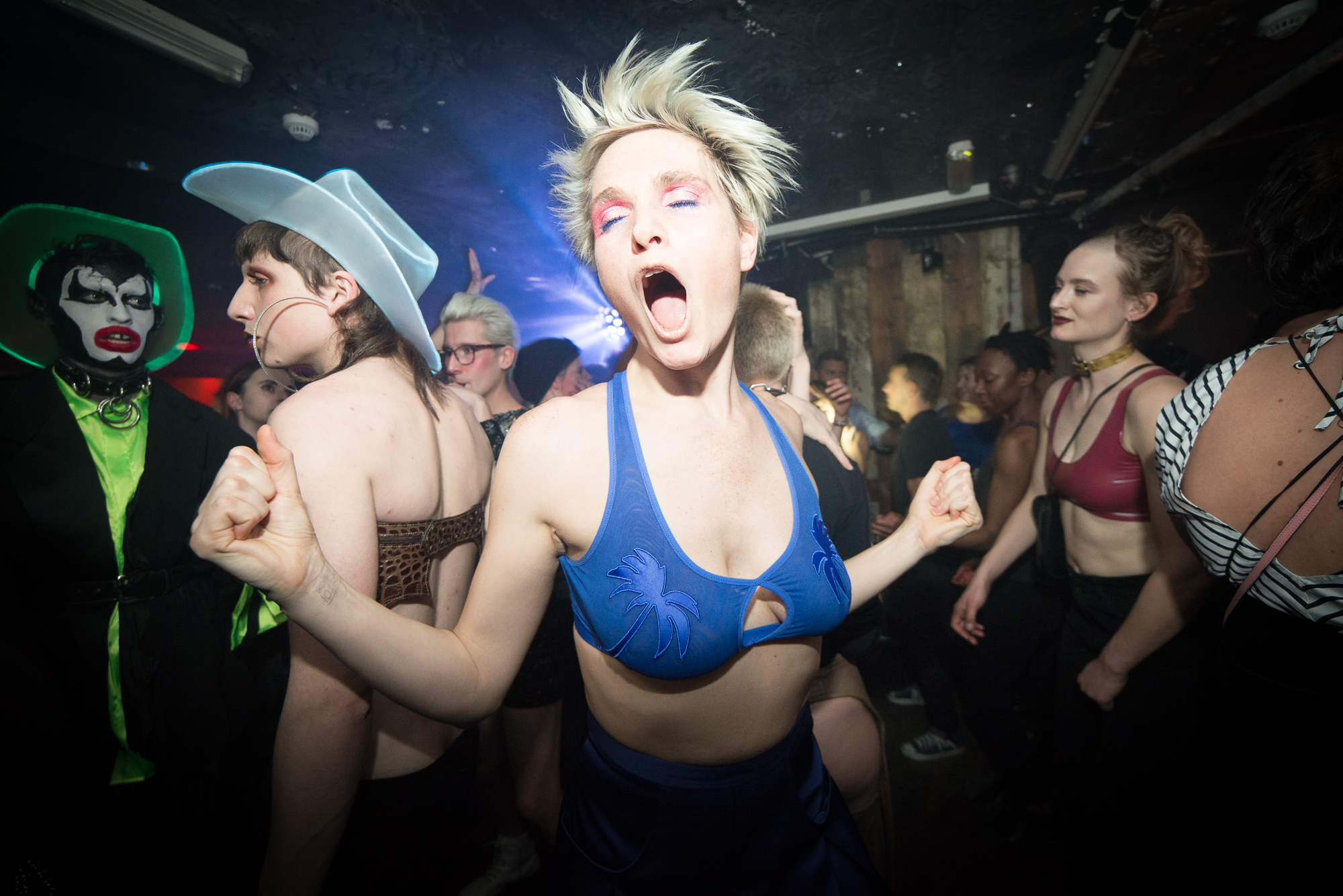
Esta es una de mis fotos favoritas de Fèmmme Fraîche, fue en la fiesta en la que pinchó Honey Dijon, fue bastante icónica, ella no era tan grande como es ahora, pero fue justo después de su set Sugar Mountain, así que la gente lo sabía y la gente vino y las colas eran descabelladas, ¡dando la vuelta a la manzana! Lo que fue especialmente maravilloso fue la cantidad de gente Trans / NB que vinieron y me sentí feliz de promocionar ese espacio para elles. Lucy Fizz, en esta foto, es una presentadora y bailarina trans icónica, la cara de Glitterbox y una persona fabulosa. Vino y trajo muchas vibraciones. Recuerdo que Dan, uno de los propietarios de Dalston Superstore, dijo: «Cuando Lucy Fizz aparece, es una fiesta especial», o algo parecido. Lo que me encanta de esta foto es que captura a Lucy, siendo Lucy de la forma más fabulosa, auténticamente ella misma, pasándoselo en grande en un espacio creado para alimentar eso…. y eso es lo que Queer Rave Culture significa para mí.
**********
- Can you introduce yourself? What does our community need to know about you?
Hi, very excited to be playing in Madrid for the first time. My name’s Michelle Manetti, east London based DJ, resident for London’s most notorious Queer rave Adonis and promoter of Fèmmme Fraîche, one of London’s biggest FLINTA focused queer parties.
- What can you tell us about the London queer scene, of which you are part, how was it built through the years and how would you define its current moment?
It’s fabulous, ever evolving and has something for everyone. It’s grown a lot over the last few years and now, it’s not just about going to a party just because it’s Gay – there’s so much choice within that, for example there’s queer nights focused on Latin X (Popola) For queer wmxn who like Techno (Big Dyke Energy) for POC Femmes (Pxssy Palace) Even for Neurodiverse queers (Spectrum) you can really find your niche, the music you like etc. It’s colourful and diverse and the community is as strong as ever.
- When compared with the continental scenes, one of the distinctive features of the London underground dance scene has always been the very prominent presence of house music and house culture. How has this scene influenced you? What do you feel you have taken from and given to it?
Oh for sure, House music and commercial music (chart top 40) have always been the most popular music for clubs in UK generally, with some other sub-genre scenes here and there, like Drum & Bass, dubstep, Garage and most recently a lot more Techno and Breaks. I’m a big house head, I’ve been going to house clubs since the mid-90s, as an underage teenager – it was the soundtrack to my adolescence, to my 20’s and most of my adult life. I found the music I loved in those clubs and along with that, friends, my people, lovers and most importantly myself, it’s been the most consistent and giving thing in my life (aside from my wonderful and supportive family) As a consumer I felt so connected to the music, I became obsessed and so the transition from consumer to provider was natural, the obsession never stops, always finding new songs, uncovering gems, the excitement of sharing that with people, making people dance and watching as they like me, find friends, themselves, make memories, it brings me so much joy to see.
- Tell us about your Femmme Fraiche parties? Looking at past events and the long list of guests you have had it looks like you achieved a good mixture of well established names with upcoming talent. Is this what you were looking for in the first place? What are the prospects for this party in the near future?
Exactly that yes, first and foremost the party set out to provide a necessary space for Queer Wxmn / FLINTA folx, but secondary to that it was about creating a platform for marginalised artists too, for the bigger DJ’s to play to a marginalised audience, as well as to provide a space and platform for up-and-coming talent. Some of those rising stars we booked have now gone on to big things, Eliza Rose and Jaguar to name two. We’ve more recently had stages and takeovers at festivals and something I’d like to push further, to grow the brand and increase visibility, as well as branching out into other areas in the musical spectrum, a label or agency perhaps. All food for though at the moment, but certainly room for growth.
- You seem to have been well rooted in the East London scene and particularly in Hackney. Hackney has been an underground music powerhouse for many years but also has lived under enormous gentrifying pressure. How have you lived those conflicting processes affecting Hackney? Do you think that being rooted locally is something important for underground dance music scenes?
I’ve lived in Hackney Wick since I moved back up to London from Brighton, 15 years ago. East is my home and for me the best part of London, it’s gritty and creative, but yes it’s changing and quite rapidly, it’s becoming much more expensive to live, so many of the creative people are moving out – money is moving in, thus the gentrification process, it’s changing the dynamic of the area. The things about the area that made it interesting and creative are slowly being killed off and pushed out, I’m hanging in there, but I don’t think it will be long until the landscape looks completely different. I saw it happen to Soho, then Shoreditch, now Dalston and Hackney – all over a 15 year period. Walthamstow, Canning town these are places with space right now, warehouse venues are popping up.. but before long, they’ll also be taken over by real estate, it’s a fighting battle at the moment with venues. For me, it’s felt important to be in the thick of it, have it on your doorstep, to live and breathe it, but seeing how transient it is now, I feel like that’s less important now, as long as it’s near enough to be accessible.
- The FACTS report from female:pressure says clearly that FLINTA people are still very much left out of the big line ups and festivals. It looks as in some European cities as Berlin or London new queer rave scenes are developing, but still lag well behind in resources compared to male dominated scenes. Whereas in other cities, like Madrid, it is still usual to find all cis white male men line-ups. How do you feel about this? How do you think this is going to evolve in the near future?
Unfortunately yes, the all cis-het-white-male line-ups do exist and are still the norm for many Electronic music festivals. I think the queer scene and other marginalised scenes do make more effort to have diversity and inclusion on their line-ups, because they understand the importance of it, but outside of that, it’s still a bit of a ‘boys club’. We have a long way to go still, but saying that, we have come a long way since I started DJ-ing. I remember before I became a DJ, there were only a really small handful of female or gender marginalised DJ’s playing regularly, now there’s way more and much more visibly. Only a few weeks ago was Risen Festival in Hackney Wick, a whole festival dedicated to FLINTA artists and all the BHS folks were FLINTA too. Just before the pandemic, there was also a poll, for the most booked DJ’s at festivals, 3 out of 5 of the top ranked were women, Charlotte De Witte, Amelie Lens, Nina Kraviz, which proves, there are some big women at the top, which is encouraging. PRS Foundation set up Keychange initiative, where 45 festivals pledged to combat gender inequality by implementing a 50/50 gender split on their respective line-ups, conference panels and more by 2022, I believe more festivals have joined since then, so things are being implemented, positive changes are happening, it’s just a slow process.
- Do you remember the first track that you played in public? How did that first gig went? Can you tell us about that experience?
I remember distinctly the first set I ever played, It was a small lesbian party in Brighton called Koochy, at a side bar of what was then the Honey Club. The promoter was a well-known queer female DJ on the scene, I’d told her several times on nights out I wanted to DJ and was learning and she called me up one day, saying she was starting a new girls night and wanted me to headline. This was around 2003, back then it was only vinyl and I planned my set, record for record, I remember calling up all the other DJ’s to tell them what I was playing and requested they don’t play the same records, they all affectionately laughed but obliged. I couldn’t tell you a single one of those records now tbh, I just remember I was so nervous I almost threw up and fainted – but I also remember how incredible the feeling was when the set went like a dream.
- When you look back, is there something you miss from those early days of djing? And something that you feel glad to have left behind?
I miss playing vinyl, I used to know every single record in my bag, inside out back to front, but I don’t miss how expensive it was to keep on top of that collection, although I do still buy some vinyl only old skool stuff, but rarely play vinyl out anymore. I wish I could say I don’t miss having those nerves, but I still get them, not in a vomit-inducing way, but def still a mild anxiety before gigs, especially the big ones – newer DJ’s often ask if these ever go away and I say no, but I also firmly believe, the moment you stop feeling nervous, is the moment you stop caring, the nerves just show you love what you do and you want to do it to your best ability and the adrenaline keeps you thirsty.
- You have started to produce music recently, and you are a singer as well, do you feel that it is very different from DJing as a work process? What are your expectations in this field?
Totally, while they are very symbiotic they’re very different skills, a good DJ doesn’t necessarily make a good producer and vice versa. Today however most good producers of dance or electronic music need to perform live as that’s where the money is, not in sales – and likewise many good DJs turn to production, because without releases you kind of hit a ceiling in terms of how far you can go as a DJ. Personally I was a singer first, but I wanted to learn how to make my own tracks to sing on rather than on other peoples, so I went to uni to learn production – but quickly realised I wanted to know what works on a dancefloor, what a DJ looks for before I can fully appreciate what makes a good track so I learned to DJ and before long the DJing became my primary skill.
- We met because, during the pandemics, you did the following XOXA NYC‘s Parcha Party to Materia Hache and we connected to the live streaming of your set. The self confinement moments of the pandemic, in a way allowed many of us beginners the time to make these new contacts and meet like minded, music loving, people well beyond borders. What has been your experience regarding this? Do you feel that the community grew up stronger and bigger after the pandemics? Is there a new post pandemic scene?
Yes, community is a huge part of the Queer scene and other underground scenes, we needed to find ways to stay connected during a time of such isolation and I think people pushed their own boundaries in order to do that. I didn’t engage a huge amount with online stuff, I’m actually quite a comfortable hermit and enjoyed the solo downtime, but it was really gorgeous to watch some of the things happening and being creatively born from this isolated frustration. I feel like post-pandemic, on the queer scene in particular a lot of young, fresh, queers started pushing through as promoters, with exciting ideas a bit more outside-the-box. I also feel post-pandemic, the crowd demographic does seem younger in clubs and parties. It’s as if the older folks realised in lockdown that they didn’t find the necessity to party any more and likewise on the flip, the younger folks who had it stripped from them were hungry for it more than ever. But I def felt the sense of community, it’s importance to have your chosen family around you, and safe places to nurture authenticity, this is even stronger post-pandemic.
- Within the week there are many hours of work by DJs and promoters that are not visible. How do you deal with weekdays, do you do more music related stuff or do you focus more on resting from the weekend?
I don’t think people fully understand the work that goes into being a DJ, they see us out at the weekend playing a few hours, and think it looks glamorous to just work a few hours a week, but this is just the tip of the iceberg, people don’t realise the hours of work in between and more-so when you’re a promoter or producer. Most of my week is filled with admin, doing stuff for Femmme Fraiche or hours spent digging for and organising new music, hustling for gigs, promo, interviews etc. Producer friends spend most days in their studios, which I wish I had more time to dedicate to as well. But I love what I do, there’s no complaints and I’m grateful I get to work full time on things I love. I do try to give myself a rest day on Mondays or Tuesdays after a weekend, just to sleep and relax otherwise the burn-out is real, especially if after festivals or long hours travelling. I’m sober when I play, so thankfully I don’t have to suffer the hang-overs or come-downs, but the late nights, long hours and lack of sleep can take it’s toll if you don’t take care.
- Can you choose a picture from your gallery that represents, in your view, queer rave culture, why do you think so? Can you tell us the story about the picture?

This is one of my fave pictures from Fèmmme Fraîche, it was at the party where we had Honey Dijon play, it was pretty iconic, she wasn’t as huge as she is now, but was just after her Sugar Mountain set, so people knew and people came and the QUEUEss were insane, round the block! What was particularly wonderful, was the amount of Trans / NB folk who came along and I felt happy to be providing that space for them. Lucy Fizz in this picture, is an Iconic Trans host / dancer, she’s the face of Glitterbox and is just a fabulous human. She came down and brought such vibes, I remember Dan who is one of the owners of Dalston Superstore saying ‘You know when Lucy Fizz turns up, it’s a special party’ or something of those words, it really was and this picture for me embodies that. What I love about this picture, is it just captures Lucy, being Lucy in the most fabulous of ways, authentically herself, having the best time in a space provided to nurture that…. and that’s what Queer Rave Culture means to me.
